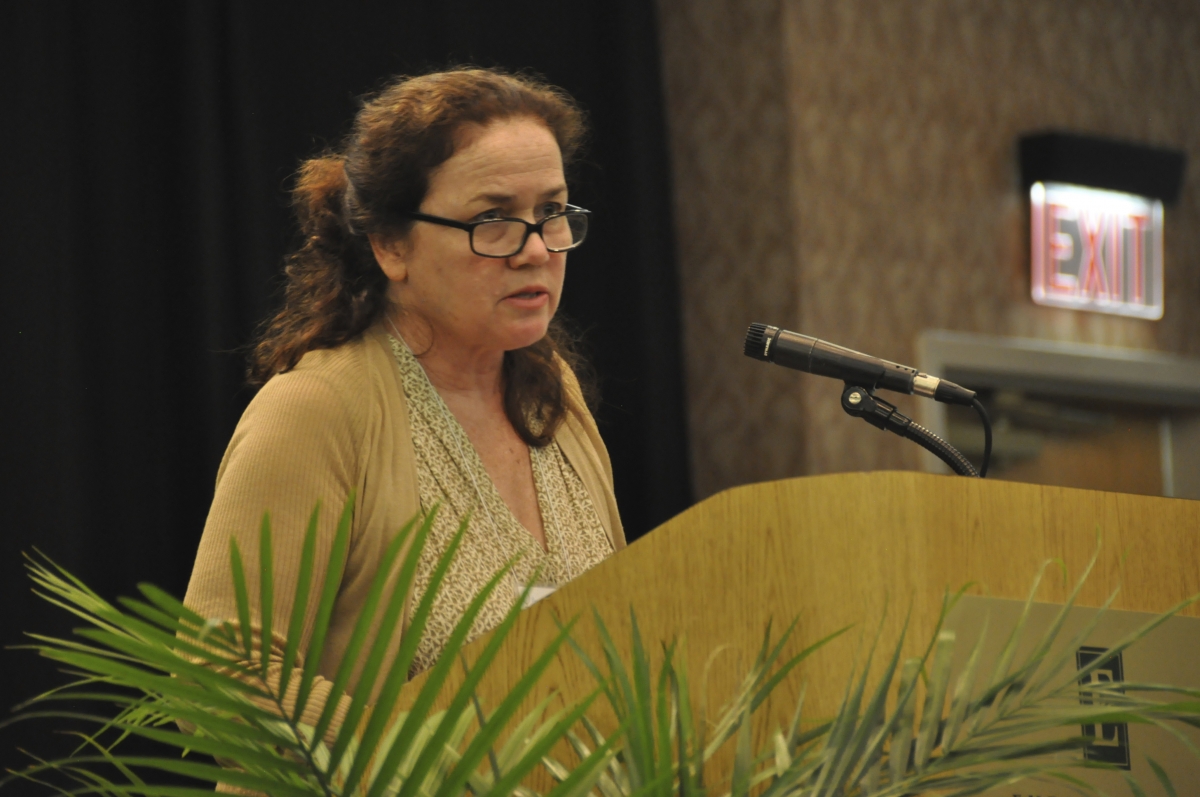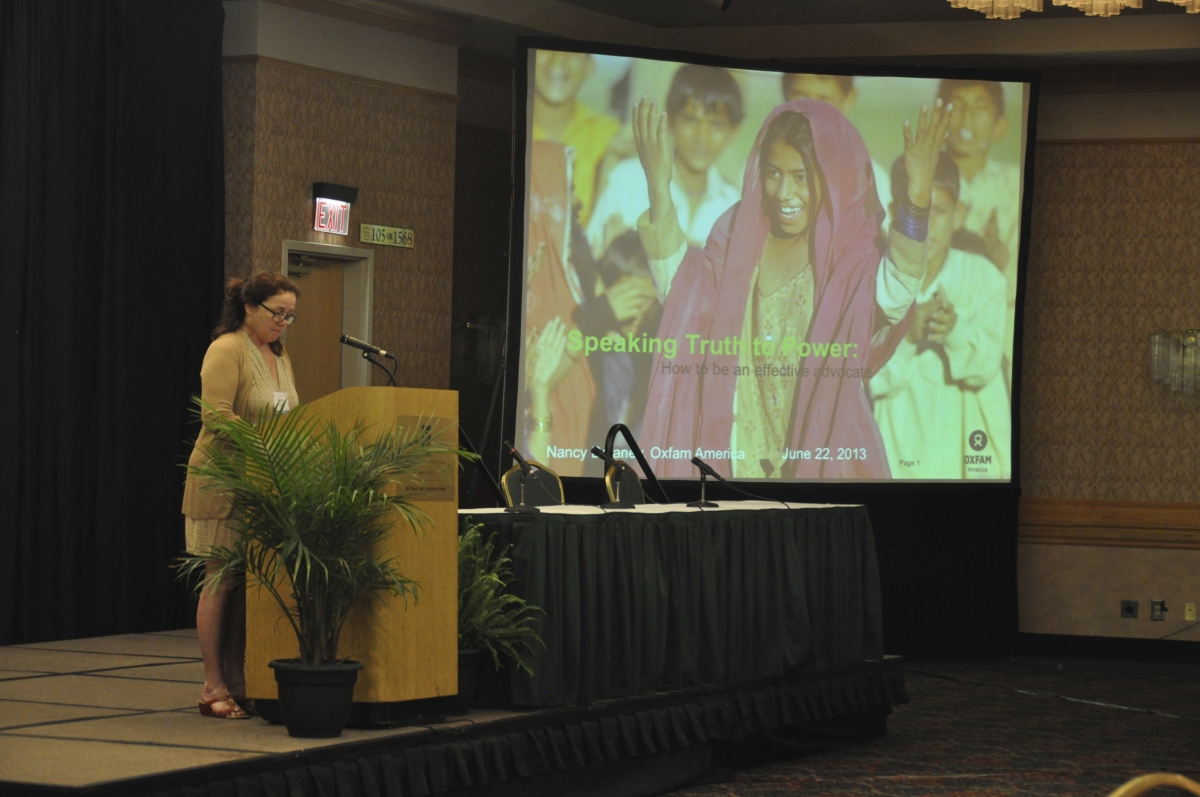Speaking Truth to Power: How to be an Effective Advocate
By Laura Haight
DFW Communications Director
If you talked to your child’s teacher, questioned your doctor or sent a letter to the editor of your paper, then you have acted as an advocate.
“We are each advocating for a host of important community and personal issues every single day,” noted Nancy Delaney, manager of community engagement for Oxfam America. “As members of the Dining for Women community, you’ve each become advocates for the women and girls whose lives and dreams you support.”
Delaney kicked off the DFW conference with a presentation on “Speaking Truth to Power: How to Be an Effective Advocate.”
Delaney’s path to advocacy grew out of deeply personal childhood experiences.
Living in a well-to-do neighborhood in El Salvador as a child, Delaney, whose father was in the foreign service, “saw people living lives I couldn’t begin to understand.” Behind their “lovely” home was a dry riverbed which was home to dozens of poor families. “I have no idea how they managed to exist.”
She recalled the day her family got a new refrigerator. “It was a very big day. Not because we had a new appliance, but because the box would serve as housing for our neighbors.”
It’s that experience as a 6-year-old that drew Delaney into the work of an advocate. “I believed quite simply that no one should depend on a refrigerator box for housing; and even more fundamentally, that no one should go hungry,” she says.
![]() Hear Nancy Delaney illustrate an example of getting to the root cause of hunger. (Refresh the page if you do not see the player)
Hear Nancy Delaney illustrate an example of getting to the root cause of hunger. (Refresh the page if you do not see the player)
![]() Download the presentation: Speaking Truth to Power
Download the presentation: Speaking Truth to Power
Delaney’s Oxfam career began as a volunteer and grew into a personal and professional commitment that she describes as “a passion, a challenge and a privilege.” Although Oxfam has many focuses, the hallmark of Delaney’s interest is the eradication of poverty.
“Poverty is not inevitable; it is solvable. Hunger is not about scarcity. It’s about power and access to resources,” she believes.
To meet these challenges, we need to use a combination of tools, including:
- Emergency assistance
- Grant making
- Advocacy
Delaney described some specific successes that Oxfam has had in advocating internationally for gender equality, safety and security. In Mozambique, for example, Oxfam helped promote a new family law that recognizes a woman’s right to inheritance, raises the minimum marriage age to 18, gives women the right to divorce and, overall, puts women on an even footing with men.
In developing countries, it is often very difficult for ordinary citizens to advocate for change. But in the U.S., Delaney said, it is “our right and responsibility – and something that surprisingly few citizens do. That means that when one of us takes the time to call or visit a representative, it carries real weight.”
Poverty and justice issues transcend politics. No one party has a monopoly on compassion. Everyone has a stake in creating a better and fairer world.
Nancy Delaney
Ordinary citizens may feel daunted by the prospect of meeting with elected officials. But she noted: “Poverty and justice issues transcend politics. No one party has a monopoly on compassion. Everyone has a stake in creating a better and fairer world.”
So how do ordinary citizens turn this idea into a reality?
Delaney outlined five basic steps to a successful meeting:
- Prepare: You want to go into the meeting prepared. How does the official stand on this issue or other issues related to it. Know something personal. You want them to know that you have done your homework. You want to anticipate their reaction and understand some of their motivations.
- Connect: Make a personal connection. Let them know if you represent a constituency. How many people do you represent. That matters very much to them. Explain why you care and put it in a personal context. You never know where connections will intersect.
- Educate: There is no need to feel like you have to be an expert. You have a right to be there. There’s a reason you care and something that drove you to take your time to do this. Present the issue. What is in it for the legislator’s constituency? Have a few strong statistics. Very often, it is information we bring to these meetings that helps to frame their decisions. This happens all the time.
- Ask: There’s a reason you went there and don’t leave without asking for it. Know what it is you want. Ask where your legislator stands on the issue.
- Follow up: If you don’t follow up, it’s like the meeting never happened. Send a thank you note. If there was an agreement, acknowledge it in writing. Send any information that was agreed to in the meeting.
“I truly believe that our voices and hard work can create change,” Delaney concluded. “Our best chance to have an impact is to use all the tools at our disposal to bear on the issues we all care so deeply about.”
About Nancy: Nancy Delaney began at Oxfam as a volunteer in 1991. Today, she is based in Boston, MA., and oversees several grassroots volunteer initiatives including Oxfam’s Music Outreach program and the Oxfam America Hunger Banquet. Nancy is also responsible for two highly regarded training and advocacy programs: The Oxfam Action Corps, a volunteer-led effort to improve national legislation and deepen local community resources for fighting poverty and injustice, and CHANGE, a campus-based leadership training focused on Oxfam’s issues that she helped to develop.


